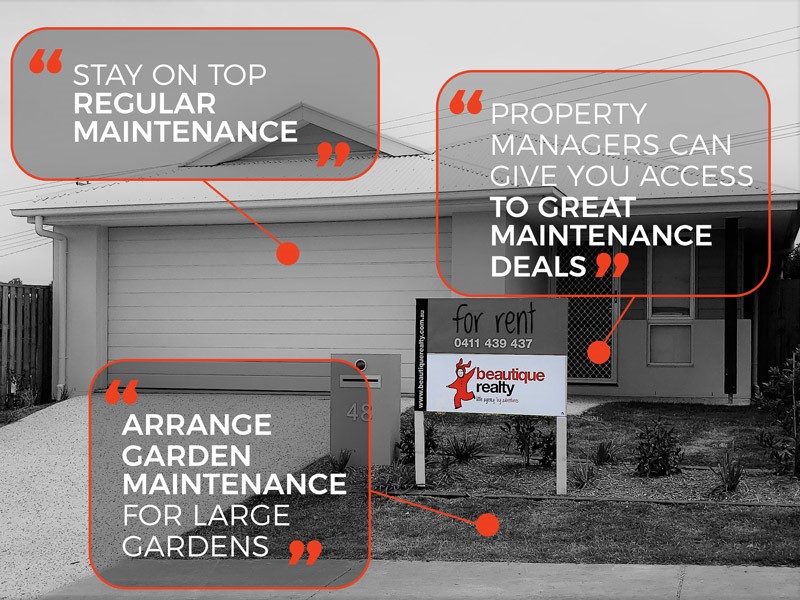In this blog post, I interviewed investment property manager Beau Miller from Beautique Reality about the common issues he sees with maintenance on rental properties, and the best approach to fixing them.
On the go? Here’s 30 seconds of take outs:
- It’s easy to have an “out of sight out of mind” mentality to your rental property, but keeping on top of regular maintenance, like cleaning out gutters, will save you time, money and hassle in the long run.
- Landlords are responsible for most of the maintenance and repairs that might be needed on a rental property. This includes garden upkeep and ensuring appliances like air conditioners, heaters, ovens and dishwashers are in good working order.
- A property manager can help you conduct regular inspections and manage your maintenance and repairs.
Keep reading >>
Marcus: So Beau, what are the main areas of concern you see with maintenance on a property?
Beau: The main problems we see in rental properties are with the things that need regular maintenance but haven’t been given the ongoing attention they need. Things like plumbing issues, blocked drains and blocked gutters. They can happen anytime and they have to be dealt with straight away. The more you stay on top of these things and do regular maintenance the less hassle you’ll have later on going out at all hours to fix them, or paying an expert to do it for you.
Marcus: Do tenants have to keep a garden alive?
Beau: According to the Residential Tenancy Authority, tenants are only really responsible for mowing the lawns and weeding the gardens. Pruning trees and hedges and all other maintenance is actually the responsibility of the landlord. So, if your rental property has a large garden we would definitely recommend you arrange garden maintenance. It reduces the expectation of the tenant, making makes things easier all round and gives you the peace of mind knowing it’s going to be looked after properly.
Marcus: What about water? If you have a large garden who pays for water usage?
Beau: It depends on the agreement that you make with the tenant on water usage. We generally charge 100% water usage to tenants. However if your property is not water compliant you might need to give your tenant a water allowance and include this in the tenancy agreement. If it’s a large garden and your tenant is going to water it and maintain it for you, you may want to give them a little lee-way and cover extra the water costs yourself.
Marcus: If there’s an appliance that isn’t working or that isn’t compliant do the owners have to address that?
Beau: If the appliance is part of the house when the tenant takes over the tenancy, for example an air conditioner, heater, dryer, oven or dishwasher; the landlord is responsible for maintenance and repairs.
Marcus: or can you take it out if it isn’t working?
Beau: You can’t actually take an appliance out after the tenants have moved in, even if it isn’t working. If an appliance that is part of the house breaks down after the tenants have moved in it’s the landlord’s responsibility to repair it or replace it with an alternative. Say the heater breaks down, the landlord could put in a reverse cycle air conditioner so there is still some heating. Other things like circuit boards, for example, if there’s no safety switch that’s something a landlord must install because that’s a safety issue. Landlords are obligated to install a safety switches same as they must have compliant smoke alarms.
Marcus: What about things like TV aerials now, where are we at with that?
Beau: Again, it’s the landlord’s responsibility to maintain and repair antennae at the property. If there is a TV aerial point on a wall inside the property it’s natural that tenants would assume there is a working antenna. So, in that instance, if the antenna either isn’t there or isn’t working then the landlord has to supply one or have the existing one repaired. There is however no obligation on the property owner to upgrade an otherwise working TV antenna to a digital antenna.
Marcus: Can you tell readers how a property manager can help landlords with maintenance?
Beau: We work with landlords to help them manage the repairs and maintenance on their properties at their request. We have a preferred suppliers list which includes about 150 professionals who we trust to carry out maintenance and repair work. They give us regular maintenance deals on things like gutters and give us the best price they can. Plus, we get excellent service. Most of our suppliers make themselves available for same day visits to our properties, especially if it’s a priority job like a blocked drain, leaky roof or power outage. We know our suppliers get the job done efficiently and thoroughly.
Marcus: How do you keep a check on the properties?
Beau: Our asset managers and assessment associates carry out visual inspections from as little as 2 to 4 times a year on all our properties depending on the requirement. What we’re looking for is a clean, tidy property with no obvious issues. We’ll also look at whether the garden is being properly maintained and we’ll check things like the oven and bathroom exhaust fans to make sure there are no maintenance issues that need to be dealt with.
We’re not builders, but we will note if there is a bit of cracking in the walls or things that we think the landlord might need to check out. If we think the property might need a more thorough building inspection we can go in and look for minor building faults and repairs, but at the end of the day, it’s the responsibility of the landlord to ensure their major asset is maintained and appropriate repairs are carried out.
Get some experts around you to help you on your way: Pinnacle Program Support
Free investor tools: Online property investment toolkit | Book Your Pinnacle Program Review







